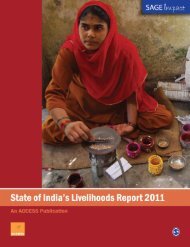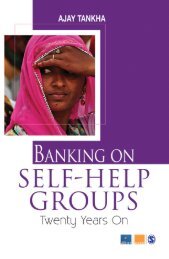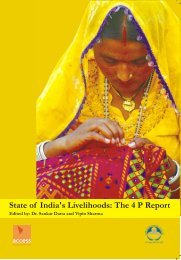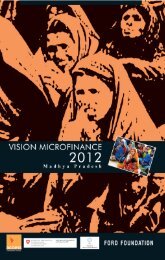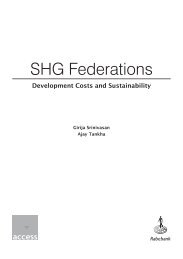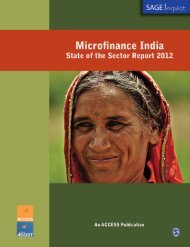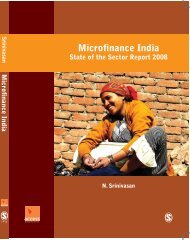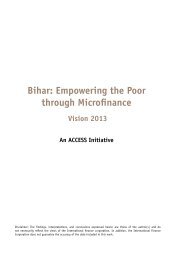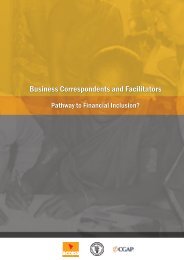Download sector_report1.pdf - Microfinance and Development ...
Download sector_report1.pdf - Microfinance and Development ...
Download sector_report1.pdf - Microfinance and Development ...
You also want an ePaper? Increase the reach of your titles
YUMPU automatically turns print PDFs into web optimized ePapers that Google loves.
Training <strong>and</strong><br />
Capacity Building<br />
in microfinance management along three tracks: electives, specializations <strong>and</strong> certificate<br />
courses for microfinance professionals. .IIMA offers microfinance as an elective in its regular<br />
agribusiness programme. Faculty <strong>and</strong> students are also engaged in preparing case studies for<br />
use in teaching. IRMA seems to offer the largest number of short-term courses. The MFMI<br />
funded "<strong>Microfinance</strong> in MBA Programs" has funded a Chair at IRMA <strong>and</strong> has enabled IIMB to<br />
set up a <strong>Microfinance</strong> Group <strong>and</strong> offer a course in Social Entrepreneurship which has a substantial<br />
section on microfinance. Responding to the need for h<strong>and</strong>holding start-ups, IIMB started a<br />
<strong>Microfinance</strong> Incubator in June 2005, funded by SIDBI, which is described in Box 6.1.<br />
Likewise NABARD, the apex for the SBLP, has funded a huge programme of training not only<br />
through the resource NGOs mentioned above, but through specialized public <strong>sector</strong> training<br />
institutions for bankers such as BIRD, NIBM, CAB, <strong>and</strong> the staff colleges of banks. 5 Of these,<br />
BIRD is sponsored <strong>and</strong> financed by NABARD as a premier training institution with extensive<br />
facilities including a library <strong>and</strong> hostel geared to providing a range of training requirements<br />
in rural credit (not just microfinance) primarily to bankers. In the Northeast the IIBM, financed<br />
by the RBI, has an extensive new campus in Guwahati, <strong>and</strong> is developing courses for the<br />
microfinance <strong>sector</strong> under both models. Much of the training offered through these institutions<br />
is geared to introducing participants to the SBL model, <strong>and</strong> tends to be more introductory<br />
<strong>and</strong> conceptual than skills oriented or even attitudinal. However, it is the NGO resource<br />
institutions closer to the ground that are better equipped to providing comprehensive training<br />
to SHPIs, especially in the crucial skills identified in Chapter 2, including bookkeeping <strong>and</strong><br />
accounting.<br />
A major recent entrant to the training field is MicroSave, which has considerable experience of<br />
training, action research, <strong>and</strong> toolkit development in Africa. It conducted a comprehensive<br />
assessment of training needs in India (Wright 2005) <strong>and</strong> has opened two offices, one in the<br />
South (Chennai) <strong>and</strong> the other in the North (Lucknow) each of which has identified an action<br />
research partner (IASC <strong>and</strong> Nirman Bharti respectively) MicroSave is a strong believer in<br />
combining class-room based learning with on-site follow-up technical assistance (see Box<br />
6.2). Among its more popular offerings are strategic business planning <strong>and</strong> process mapping,<br />
<strong>and</strong> it is developing a series of toolkits specific to Indian conditions on topics like market<br />
research, governance, <strong>and</strong> delinquency management. Thus it is equipping itself to deliver<br />
both managerial <strong>and</strong> skills training, <strong>and</strong> hopes eventually to train <strong>and</strong> work through about 60<br />
"low-cost but high capacity" consultants, either individuals, or grouped in mostly young <strong>and</strong><br />
new consultancy firms. The consultants will be trained in the use of rapid institutional<br />
assessments after which they will provide both class-room training <strong>and</strong> long-term mentoring<br />
to assisted institutions. A scheme is under discussion with ICICI to assure them a minimum<br />
income, under which ICICI will pay them a monthly retainer for assisting a certain number of<br />
ICICI borrowers each, with MicroSave providing continuing back-up support.<br />
MicroSave is a<br />
strong believer<br />
in combining<br />
class-room<br />
based learning<br />
with on-site<br />
follow-up<br />
technical<br />
assistance<br />
Another recent entrant (<strong>and</strong> distinct model) is "ACCESS <strong>Development</strong> Services" which has been<br />
registered by CARE as a S 25 company, <strong>and</strong> as a successor institution to the capacity building<br />
component of the CASHE project, which is due to end in December 2006. Access will have the<br />
same emphasis on community-based institutions as CASHE, such as SHG federations <strong>and</strong> SHPIs,<br />
<strong>and</strong> hopes to incubate 100 currently un-banked partners over the next five years. Incubation<br />
will be the responsibility of separate regional responsibility centres such as the MLRC<br />
(<strong>Microfinance</strong> <strong>and</strong> Livelihood Resource Centre) being set up in MP. Access has received grant<br />
103






